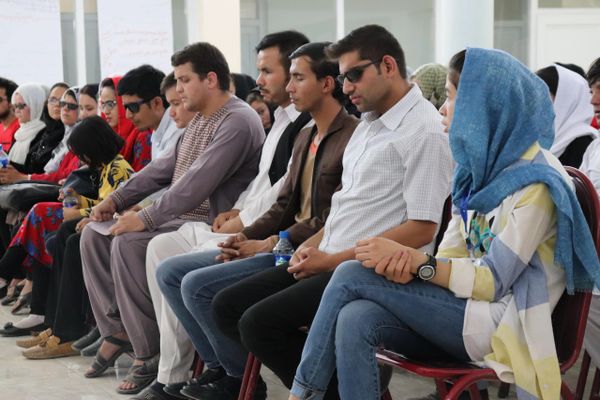
LOYA for PEACE
Farida, along with several other young Afghans, some of which were fellow AGFAF students, mobilzed to form LOYA for PEACE...
Background:
For over a decade Afghans have been pursuing peace through negotiations with the anti-government groups, as a result, groups such as Hezibi Islami joined the Afghan government. However, due to poor management and lack of coordination with regional countries, the attempts to negotiate with the Taliban have failed.
In February 2019, the United States began peace talks with the Taliban. Finally, this summer the Taliban and the US were on the verge of signing a peace deal, this was going to be a turning point in the history of Afghanistan. To many, this meant that the Taliban would join the Afghan government and once again have the power to rule over Kabul and other provinces in Afghanistan.
Among many other questions, the ambiguous future of Afghan women was one that concerned Afghan women the most. This was while the negotiation lacked the formal participation of Afghan women and youth. When women did participate, they were expected to only talk about ways to increase women’s participation in these talks and their concerns and hopes for the future of Afghan women after the peace with the Taliban.
Another challenge for normal Afghans citizens was whether they were ready to accept the Taliban in their societies. Were normal Afghan citizens ready to live with the Taliban and forgive them after years of war?
LOYA for Peace:
I spent my summer founding a youth organization, LOYA (League of Young Afghans) for Peace with the support of AGFAF and mentorship of Nasir Kaihan, Joe Highland, and Alireza Hussaini. My team, at LOYA, consist of eight young Afghan students; most of whom are U.S. educated.
We believe that political peace can be attained through peace deals and peace talks amongst politicians, but social peace can be only attained when citizens are ready to forgive each other and live together.
Our mission is to raise awareness the role of women in peace-building and conflict resolution and to facilitate conversations about the roles of youth and women in a post peace Afghanistan.
Our primary audience is high school students.
This past summer we held a week-long a symposium in the Blind School of Kabul where over 65 students from eight different high schools and organizations participated. During this week, we had presentations covering different topics such as such as the current Afghan Peace Process, the 1395 resolution, NAP- Afghanistan, Transitional Justice, the role of women in peacebuilding based on Islam Sharia, the constitution of Afghanistan, and the role of women based on the history of Afghanistan and countries such as Liberia and Sierra Leone, and the role of youth and visually impaired citizens in peacebuilding.
We also had guest speakers who talked to our delegates. Our guest speakers consisted of senior Afghan government officials, experts on the topic of peace-building and conflict resolution, and female peace activists. We were very honored to have these speakers at our program and very lucky to meet them in person, rather than watching them talk on the television.
We also had peace-related games and discussions around the mentioned topics. For entertainment and networking purposes, we also had live music and fun games.
At the end of the program, AGFAF provided the students with the opportunity to do a peace project in their high schools. Although due to security reasons, they have not finished their projects yet. Some of the projects include: a book compiled of stories of peace in Afghanistan, biking to historic places that have been rebuilt after the wars, an art exhibition on peace, a week-long campaign for smile and hope, and more.
One of the biggest accomplishments of LOYA for Peace was a peace resolution written by students from nine different high schools and organizations. The peace resolution is consistent of 13 articles and demands for access to education for every Afghan child, ban of under-age and forced marriages, ban of child labor, prohibition of physical and emotional abuse in schools of Afghanistan, ending street harassment, protecting the environment, and more (will soon be translated in English). In the last article of this resolution, the students are demanding acceptance of the children of the Taliban in their societies and want to build a friendship with their youth of the Taliban.
LOYA Highlights

















Afghan Girls Financial Assistance Fund
1378 Route 206, Suite 6-279, Skillman, New Jersey 08558
Copyright © 2018 Afghan Girls Financial Assistance Fund - All Rights Reserved.